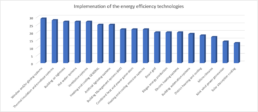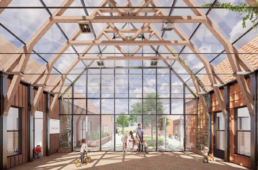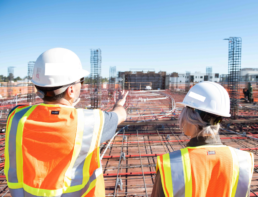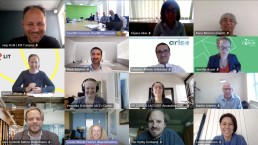Reaching a Sustainable Built Environment: Our Analysis
We just published the Report: “European roadmap: BIM applied to energy performance”.
The report provides inputs to develop a roadmap to achieve the correct development of a workforce ready to face the challenges of climate changes. The report starts recalling the requirements already defined in the European directives dealing with energy performance, the use of renewable energy sources, and digitalisation. Then, starting from the outputs of the previous deliverables, the roadmap summarises the knowledge, the skills and the competences needed both on the demand side and the offer side to obtain more resilient buildings to climate change with a decreased use of natural resources.
The roadmaps intend to ensure that current and future stakeholders interested in increasing the competences in the energy and digital domains, guarantee that existing and future training materials are adequate and continuously adapt to change. The roadmaps start from an in-depth analysis of the status quo in the participating countries.
The roadmaps should allow any company, public administration, and individual to fill the gap of competences and take advantages of all innovative energy and digital technologies.
In all the partner countries there is legislation supporting both the use of renewable energy sources and the improvement of the energy performance. Digitalisation is not always compulsory, but there are many initiatives to increase the competences in this domain starting from the public tenders where the use of BIM is becoming required in many countries. Consequently, we expect a huge future increase in the demand of digital competences needed in all the supply chain.
To provide the basis for the development of national roadmaps we considered a matrix where we suggest the level of knowledge/competence of the different targets for each technology. Digitalisation should be considered an instrument and not a final goal and should be applied by any blue and white collar of the building supply chain during its whole life cycle.
The goals of the directive are the same in every country. However, some countries are a few steps ahead in its implementation. To ensure the achievement of the same level by all, it is essential to promote the implementation of new technologies on both the demand and the offer side.
Based on a survey circulated among the project partners, we can make some interesting assumptions.
There is a strong correlation between the quality of the national VET (Vocational, Educational and Training) and LLL (Life-Long-Learning) systems and the use of technologies related to energy performance in buildings. North European countries developed more reliable training systems, and as a consequence they also make a better use of RES and technologies for energy efficiency. There is a persistent need, in all countries, to facilitate the use of more innovative technologies, which are still rarely taught in formal training.
In the following two diagrams we can observe the level of implementation of the different technologies considering the average of the different countries.
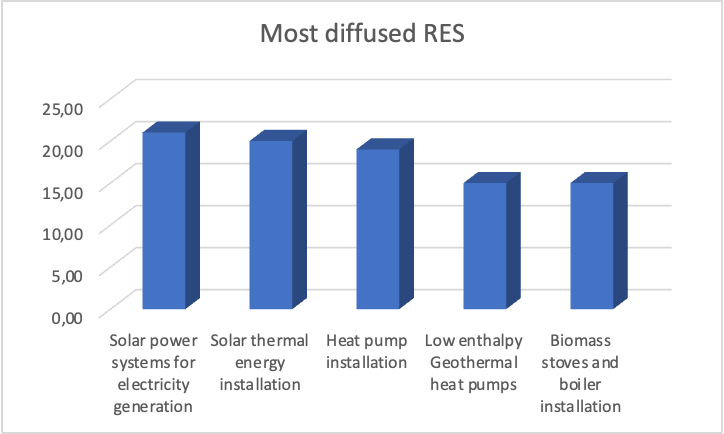

The ARISE platform can provide the support needed to achieve a higher maturity level in any sector and for any target as it is based on micro-competences. Thanks to the platform, the new technologies can be introduced directly by their producers. They can use it as a mean to provide training materials to be able to design, install and maintain new equipment and/or materials that can improve the energy performance of buildings.
The implementation of digitalisation shows that the problem is more related to the lack of a full maturity on the demand side. Designers are usually ready to implement digitalisation as it facilitates their work, but if the demand of public administration and both public and private owners does not increase, it cannot be fully implemented in the supply chain. The consequence is that the owners cannot profit from the benefit of managing all the information linked to their assets in order to decrease the cost of management and maintenance.
In the following diagram we can observe the different levels of maturity as average of the situation in each of the partners’ countries.

If the constructors do not implement the model received by the designers with the information of the products and equipment used and installed, the owner gets only marginal benefit from the BIM model produced by the designer. Therefore, there is a strong need to increase the comprehension of the benefits introduced by the full implementation of BIM in the supply chain. This analysis is also useful for training program developers and providers, providing them with directions on how to profile their programs.
In this case too, the ARISE platform can be beneficial as the European chapters of buildingSMART international are working for an agreement aimed at increasing awareness of the benefits of BIM along all the supply chain using the training materials developed for the individual qualifications available for free to everyone.
For more information, download the Report here.
How are climate change, the construction industry and BIM connected?
It is common knowledge now that the construction industry is one of the major culprits of the ecological footprint. The cement industry alone is in third place for the production of CO2 after the countries of China and the USA. Time is running out, and all designers in the sector need to begin to work collaboratively to the transition towards more sustainable paths.
However, designing zero energy buildings is not enough. We must also reduce the use of materials that pollute excessively and the overly exploitation of natural resources. We need to put in place plans for reusing and recycling, and the materials to recycle should come also from waste, and not only from the demolition of buildings.

In Copenhagen, during the conference organized on December 7th by KEA (Copenhagen School of Design & Technology), it was underlined the importance of architects and engineers considering the use of appropriate materials already in the preliminary design phase. Also important is limiting the use of reinforced concrete to those buildings and structures that really need it and, wherever possible, considering alternative solutions that can be even more performing. It is also necessary to reuse the material resulting from demolitions in a smart way.
In France and Denmark, in application of the European recommendations for the reduction of the ecological footprint, the law requires the declaration of the total of CO2 produced. Not only as LCA, i.e. a simple certification of how much CO2 that particular building produces, but it is also required to justify the choice on the materials, which must produce less CO2 than alternative solutions.
During the debate following the conference it was rightly pointed out that "virgin" materials often have a lower cost than the recycled ones because the production process from raw materials is simpler than the recycling of existing materials, especially if their composition is unknown. Soon however, to encourage recycling, in Denmark it will be introduced a tax on the production of CO2, which will make the price of the two choices comparable and will possibly make recycled materials more advantageous.
In Denmark, they initiated pilot cases in which, for example, it was approved the project of a nursery school in place of an old abandoned school, provided that the materials derive from the demolition of the old structure. In place of the old school there are now two soccer fields and a nursery school built sustainably and on a zero impact criteria. This thanks to the saving of "virgin" material which normally requires a large energy contribution, both in production and for transportation. Furthermore, wood has once again become the first choice, both for new houses and for renovations.
The role and contribution of BIM in all of this was also discussed. A software was shown that BIM allows to evaluate the CO2 footprint, just as there are already 4D and 5D software that allow to evaluate times and costs. Each product is connected with its ecological footprint, i.e. with the carbon dioxide produced for its production. In this way, it is possible for the designer to attribute a real value to the ecological footprint of the entire building.
It is clear that the role of material producers is becoming more and more Impactful. They must transition from providing the values that certify the "ecological footprint" in simple pdfs, to the transmission of data that can be directly read by design software. To allow this, the bSDD is already available, i.e. a service that buildingSMART International makes available to "translate" any property and geometry into data that can be read by modeling software.
Essentially, it is enough to connect these properties and values to each element. As an example, the "wall" properties can be linked to reinforced concrete, solid bricks, hollow bricks, laminated wood, recycled panels and so on to which the manufacturer will have to associate the corresponding "CO2/metre" properties. The software, at that point, can directly calculate the final footprint.

By changing the material, in a few clicks, the final value can automatically be updated. This will facilitate the final selection.
However, there is still a long way to go. For example, we need to work on new legislative instruments that support this approach. In public tenders, it will be necessary that the ecological footprint has a weight in the selection, so that designers are encouraged to make more ecological choices. It will also be important to help small producers of recycled materials to certify their products with the CE mark in order to be able to place them in the market. It will also be necessary to properly train manufacturers and the workforce to use these new products correctly. Finally, it will be necessary to support research in this sector.
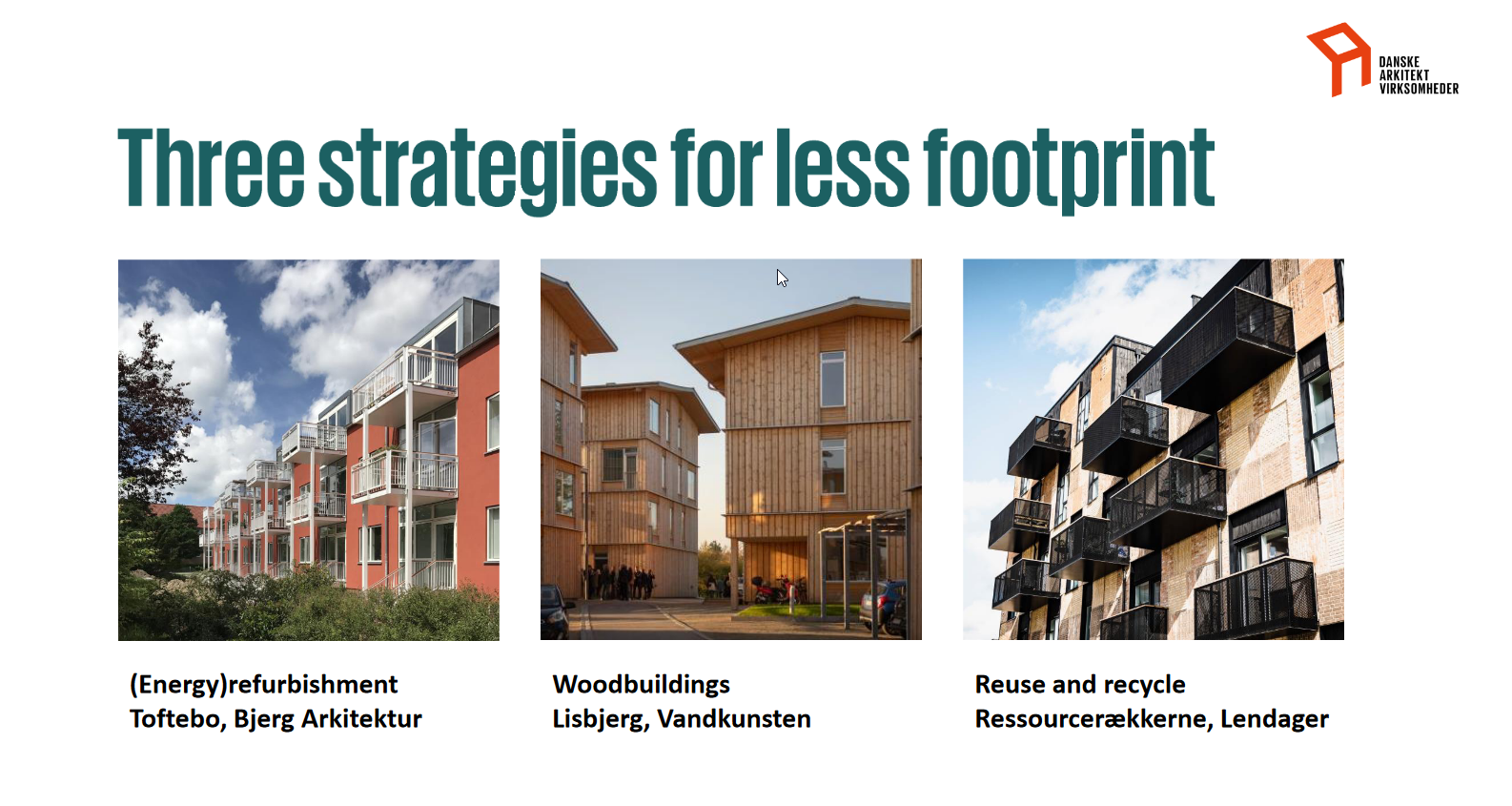
These topics will also be addressed during the next buildingSMART International Summit, which will be held in Rome from 27 to 30 March 2023.
All the European chapters of buildingSMART will also meet, on this occasion, with the European Commission (DG Growth) to look for agreements to ensure that part of the substantial funding foreseen for the construction sector will be directed to these activities. We invite you to participate numerous at the Summit, that is open to all interested parties in the sector, members and non-members of buildingSMART.
Presentation and images by Lene Espersen
Article by Anna Moreno and Caterina Nissim
The role of ARISE in the implementation of the new RES directive
Anna Moreno, Caterina Nissim
The proposal for a new directive on the promotion of renewable energy sources
The DIRECTIVE OF THE EUROPEAN PARLIAMENT AND OF THE COUNCIL amending Directives (EU) 2018/2001 and 98/70/EC, and the Regulation (EU) 2018/1999 as regards the promotion of energy from renewable sources is a proposal presented in July 2021. Some of the amendments are related to the national system for the qualification system of designers and installers of Renewable Energy Sources (RES) and they are therefore relevant for the ARISE partners.
Let’s examine these modifications in more detail.
Addressing the shortage of competent installers
This proposed modification intends to provide more experts in the domain of designers and installers of RES technologies but also to give the opportunity to other innovative technologies to be promoted thanks to the support of proper qualifications and certification systems. Below, In italic, the original text:
Article 1(7) amends Article 18(3) REDII with adjusted paragraphs on the qualification and certification requirements of installers to deal with the fact that there is a shortage of installers of renewable heating systems, which is a ‘brake’ on phasing out fossil fuel systems. It also deletes the list of specific types of renewable heating technologies and replaces it by a generic reference to RES heating systems.
This proposition opens the market to innovative solutions. ARISE's objective is to deliver a common platform where the competences about the new technologies are based on knowledge, skills and the degree of autonomy following the European Qualification Framework (EQF). For example, the producer of a new technology will be able to provide both the list of the new competences needed to design and install the new system and provide the body of knowledge for training workers and designers. This way, the developers of the new technology will be able to upload to the platform the body of knowledge required to design and/or develop training materials on the correct use of the new technology.
Making a public list of installers a requirement in each Member State
The new directive makes the creation of a public register a requirement:
It amends Article 18(4) REDII by obliging Member States to put in place measures to support participation in training programmes. The previous possibility for Member States to make the list of qualified installers public becomes a requirement.
In the deliverable 2.4, to be published soon on the ARISE web site, we mention the heterogeneity of the Member States on the issue. In countries such as Ireland and the Netherlands, public registers are already required and managed by a national organism while other countries, Portugal and Italy to mention a couple, are still far from the target. In Italy, the qualifications for the installers are realised at regional level, making the development of a national register extremely complex. ARISE will present a solution on a European scale, as the certification of the single competences would provide the tools to develop a singular national/European register. For each technology, it will be identified a list of compulsory competences at European level and each country/region will be able to identify the designers and workers who own those competences.
Requiring transparency in certification schemes issued by Member States for a mutual recognition
In Article 18, paragraphs 3 and 4 are replaced by the following:
- Member States shall ensure that certification schemes are available for installers and designers of all forms of renewable heating and cooling systems in buildings, industry and agriculture, and for installers of solar photovoltaic systems. Those schemes may take into account existing schemes and structures as appropriate, and shall be based on the criteria laid down in Annex IV. Each Member State shall recognise the certification awarded by other Member States in accordance with those criteria.
The ARISE platform will provide the tools for mutual recognition. Each Member State will identify its need in competences for each specific technology by referring to the ARISE platform unit of competences. The need in competences are obviously different in each country, depending on the climate, national regulations and so on. Thanks to an adaptation of these needed competences in each different country on the ARISE platform, it will be possible for workers to move and relocate in different countries all over Europe.
Increasing the number of qualified installers covering renewable heating and cooling technologies
Member States shall ensure that trained and qualified installers of renewable heating and cooling systems are available in sufficient numbers for the relevant technologies to service the growth of renewable heating and cooling required to contribute to the annual increase in the share of renewable energy in the heating and cooling sector as set out in Article 23.
To achieve such sufficient numbers of installers and designers, Member States shall ensure that sufficient training programmes leading to qualification or certification covering renewable heating and cooling technologies, and their latest innovative solutions, are made available. Member States shall put in place measures to promote participation in such programmes, in particular by small and medium-sized enterprises and the self-employed. Member States may put in place voluntary agreements with the relevant technology providers and vendors to train sufficient numbers of installers, which may be based on estimates of sales, in the latest innovative solutions and technologies available on the market.
ARISE has conceived an “open platform” guaranteeing the opportunity, for any professional and worker, to reach the desired “maturity level” for any technology necessary for their work as self-employed or employee. The ARISE platform is also open to producers who wish to ensure that designers and installers own the right competences to design and install their technology correctly.
Public lists of qualified/certified installers
- Member States shall make information on the certification schemes referred to in paragraph 3 available to the public. Member States shall ensure that the list of installers who are qualified or certified in accordance with paragraph 3 is regularly updated and made available to the public.
ARISE will provide a system to certify the single competence through blockchain technology. This means that each competence acquired will be certified and it will not be possible to “manipulate” it. The union of all competences required by each Member State to perform a specific activity, will be identified in the same ARISE platform so that workers will know what the gaps consist in.
Accreditation of the training programs
- The accreditation of the training programme or provider shall be affected by Member States or by the administrative body that they appoint. The accrediting body shall ensure that the training programme offered by the training provider has continuity and regional or national coverage.
The training provider shall have adequate technical facilities to provide practical training, including sufficient laboratory equipment or corresponding facilities to provide practical training.
The training provider shall offer, in addition to the basic training, shorter refresher and upskilling courses organised in training modules allowing installers and designers to add new competences, widen and diversify their skills across several technologies and their combinations. The training provider shall ensure adaptation of training to new renewable technologies in the context of buildings, industry and agriculture. Training providers shall recognise acquired relevant skills.
The training programmes and modules shall be designed to enable life-long learning in renewable installations and be compatible with vocational training for first time job seekers and adults seeking reskilling or new employment.
The training programmes shall be designed in order to facilitate acquiring qualification in different technologies and solutions and avoid limited specialisation in a specific brand or technology. The training provider may be the manufacturer of the equipment or system, institutes or associations.
The ARISE partners do not intend to organize trainings themselves, but to support training institutions by providing the tools to train and qualify blue and white collars for each technology. The platform will be the hinge between two worlds: the technologies producers and the workforce. Training providers will be able to propose the right qualifications selecting the competences in the ARISE platform and accessing to the right training materials. A minor percentage of the fee charged for the courses will be directed to the ARISE platform managers to ensure a regular update of contents. The training providers will manage the access to the trainees who wish to certify their competences with blockchain through the platform.
ARISE’s ultimate goal is to revolutionise the learning process by changing both delivery and recognition of sustainable energy skills in the construction sector. The new system of training and recognition of skills will be valid across the EU, thus increasing the spread of skilled workforce in the building market. The ARISE platform will be the tool to facilitate the duty of any stakeholder of the building chain (owners, producer, training institutions, workers, designers, regional and national qualification organizations) and will substantially contribute to the mobility of workers and services in the building industry through all Europe and beyond.
Anybody interested in contributing to the testing of the platform, please contact us and join our Forum on LinkedIn to participate to open debates.
Desk research on maturity analysis of digitalisation and sustainable energy skills
The ARISE team is carrying out Desk research on maturity analysis of digitalisation and sustainable energy skills.
The research is led by IECE on models of digital and energy skills frameworks and maturity levels, and developed by several H2020 and Erasmus+ funded projects and international brands (bSI).
The comparative study will include multi-criteria evaluation of skills and qualifications frameworks, identifying the level of compliance and complementarity and specifying similarities and differences thereof, as a specific proof of the ARISE concept of international transact-ability of learning achievements and competencies. One of the study outputs will be a novel model of levelling and alignment matrix developed by the learning outcomes based methodological approach and tested within the team, on several selected professional profiles. In further steps, it will be aligned with the UNESCO and CEDEFOP methodology (2017) by considering NQF as a reference point, and suggested as a sectoral methodology of comparison, alignment and transfer of qualifications.
The report will be published in early Spring 2022.
Access the link below for more information:
https://www.ariseproject.eu/reports/
Sustainable energy skills in the construction sector joint workshop 2.0 at #SP2021
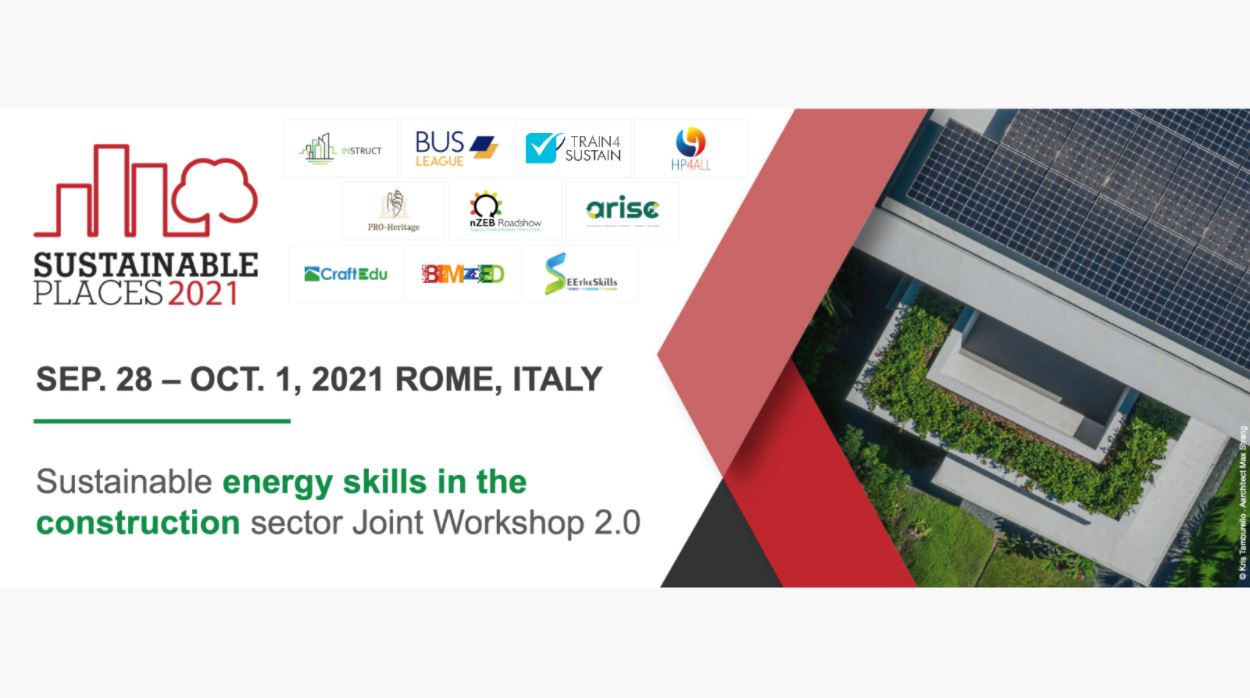
ARISE will develop an on-demand mobile-friendly training project portal forc and sustainable energy in the construction sector. The project will also create a "cryptocurrency" of development skills and learning in the digital built environment to stimulate engagement and quantify skills development and learning.
You will find the registration of the workshop at this link.
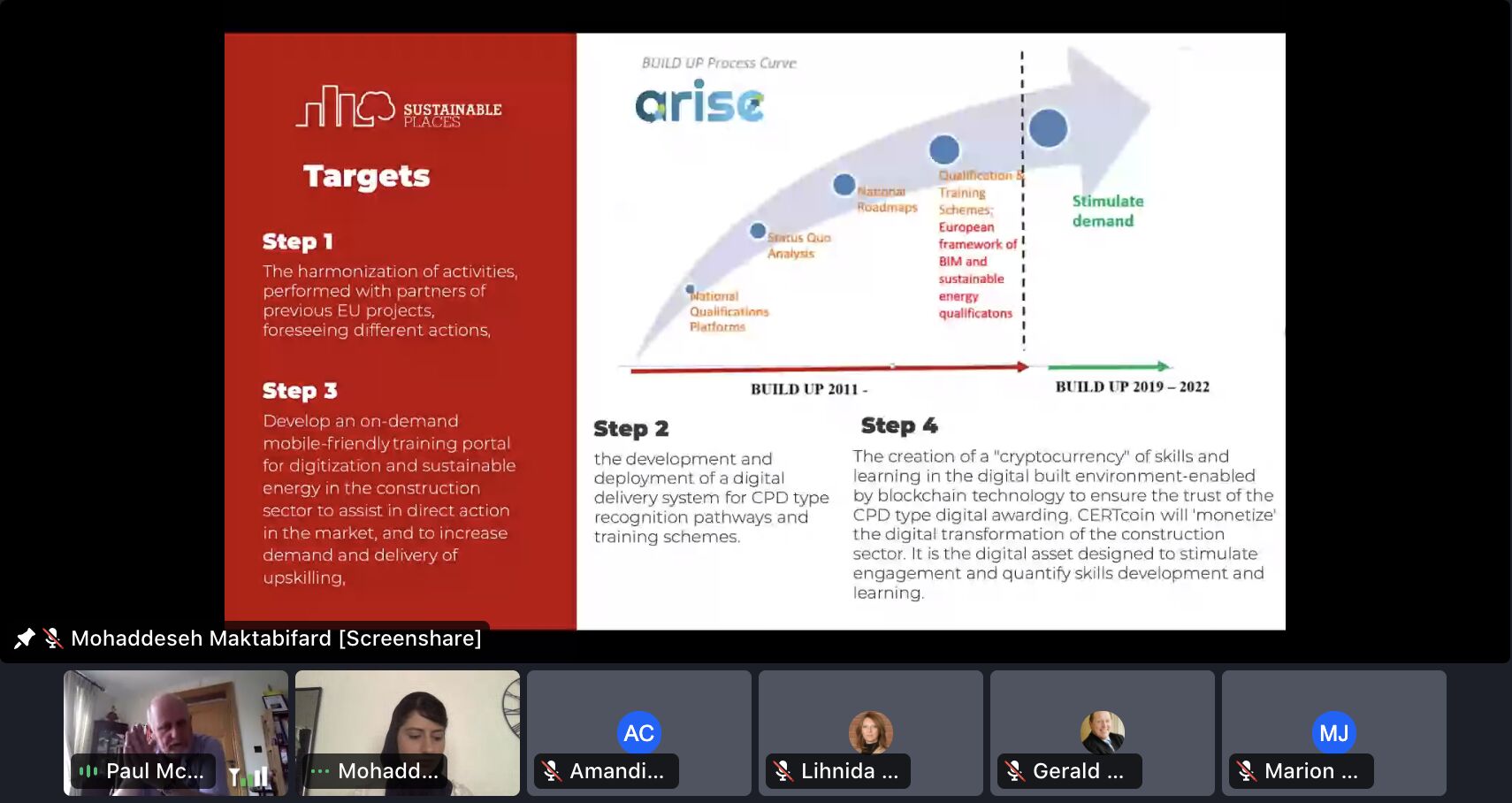
You Tube recording:
https://youtu.be/xlZseb0UzMQ
ARISE Launch
Belfast Metropolitan College launched their new £1.12 million European digital construction project, ‘ARISE’ in the 2 days KICK OFF meeting 1st and 2nd September 2021.
ARISE aims to revolutionise the learning process by changing the face of delivery and recognition of sustainable energy skills in the building sector.
ARISE’s mission is to support the twin transition of the design and construction sector and to contribute thereby to the European Recovery and Resilience Plans 2021 -2027, by providing the building sector professionals with digital and sustainable energy skills of the future, along with demand-side guidelines for marketable appreciation of skills and exploitation of benefits thereof.
The nine partners in the project consortium are:
- Belfast Metropolitan College, Northern Ireland
- Technological University Dublin, Ireland
- Institute for Research in Environment, Civil Engineering and Energy, North Macedonia
- ISSO, Netherlands
- Architects’ Council of Europe, Belgium
- IBIMI Institute for BIM, Italy
- Building Changes, BV, Netherlands
- Copenhagen School of Design and Technology, Denmark
- Instituto Superior Technico, Portugal.
On the opening launch day on Wednesday, September 1, Belfast Met Innovation Manager and ARISE Programme Manager, Paul McCormack gave an introduction and outlined the challenges and objectives for the 30-month programme.
Louise Warde Hunter, Principal and Chief Executive of Belfast Met also addressed the opening day audience with: “Today’s ARISE launch reinforces Belfast Met’s commitment to engage in international partnerships and applied Research & Development, working in innovative ways with industry to meet the emerging skills needs of the economy at home and abroad. “
“Our People, our Planet, and our Partnerships are key to addressing the interconnected challenges of sustainability at TU Dublin. The ARISE project creates a positive impact by addressing real-world challenges in the construction sector through the upskilling of individuals to reach their infinite potential. ARISE leverages learning post-Covid, by offering bite-size educational units through a digital mobile curriculum to enable learning opportunities that are accessible and sustainable in our daily lives.” Stated Ms Jennifer Boyer, Vice President of Sustainability, Technological University Dublin, one of the nine European partners on the project, which has Belfast Met as the lead partner.
The funding for the project was gained through the EU Horizon 2020 Work Programme. Ms Amadine De Coster-Lacourt, Project Advisor, (CINEA), European Climate, Infrastructure and Environment Executive Agency, highlighted that: “ARISE will contribute to the Green Deal and the Renovation Wave objectives by facilitating recognition of sustainable energy skills in the built environment and increasing demand for those skills”.
The distinct work packages work to be carried out by the partners were discussed and detailed Work Packages.
- WP1 MANAGE Belfast Met
- WP2 BENCHMARK energy & digitalisation skills IBIMI - Italy
- WP3 DESIGN framework ISSO The Netherlands
- WP4 DEVELOP autonomy e-engine KEA - Denmark
- WP5 FILL agility e-tools TU Dublin
- WP6 PILOT Digital Pathway energise Belfast Met
- WP7 REPLICATE market implementation IECE Macedonia
- WP8 COMMUNICATE dissemination & exploitation ACE Belgium
Martin Lennon, Director, (OHMG), O Hare McGovern stated: “The early involvement of OHMG with (previous project) BIMcert was the platform that escalated our BIM journey, ensuring we remained at the forefront of digital innovation.
“ We are delighted to once again join with BMET and their international partners, at the start of their ARISE project journey. The result of this partnership will ensure OHMG have a skilled workforce who will have the knowledge, experience and competencies to deliver on the Government’s Construction 2025: Strategy”.
Mark Baldwin, Building Smart International, in Switzerland added: “Competency assurance is a significant aspect contributing to the success and sustainability of the digitalization of the built asset industry.”
ARISE will revolutionise the learning process by monetizing skills development and learning exchange with a digital system based on skills recognition rather than accreditation. The training and transaction system developed by the project will reward learners as they achieve competence at a certain level with the cryptocurrency for skills exchange - CERTcoin – the innovative currency of skills and learning of the design and construction sector embracing today’s digital transformation benefits. This reward-based on skills and time credits will be stored in an Individual Learning Account and can be used as digital points accumulation for example in a skills barometer or for exchanging it into valid certificates. It will be an easier accessible, less time consuming and still competitive way to up-skill design and construction professionals and workers, as well as market demand side – public administration, clients and owners.
ARISE will apply digitalisation both as a learning method and as a framework of job-based construction skills of the future, multiplying the effects of the green transition skills. The novel training method will make the learning process attractive and effective, facilitating its accessibility through a mobile (smartphone) and a user-friendly web-based platform. The intervention/learning progress will be achieved in a scalable way, in bite-sized skills delivery. ARISE will apply digitalisation and the earning of learning credits in a "step by step" recognition of competencies, as an accelerator to empower demand for sustainable energy skills in the desing and construction sector, and as an enabler of formal certification. This system will be employed based on blockchain procedures to instil transparency and trust.
Within 30 months, until February 2024, partners will work on the development and demonstration of the innovative on-demand training scheme for digitalisation towards sustainable energy skills, aimed at both supply and demand sides.
Revolutionising the learning process by changing the face of delivery and recognition of sustainable energy skills in the construction sector
That’s the target for the ARISE project team as they seek to deliver their new EU wide skills and training project, boosting thereby market uptake of qualified workforce.
ARISE has secured a €1.12M grant from the Horizon 2020 Work Program: Building a Low-Carbon, Climate Resilient Future: Secure, Clean and Efficient Energy, under the Call: Increasing Market Demand for Sustainable Energy Skills in the Building Sector.
ARISE’s mission is to support the twin transition of the construction sector and to contribute thereby to the European Recovery and Resilience Plans 2021-2027, by providing the construction sector workforce with digital and sustainable energy skills of the future, along with demand-side guidelines for marketable appreciation of skills and exploitation of benefits thereof.
Through a highly innovative approach, ARISE will deploy a system coupling methodology and approach, and encompassing:
1) Skills delivery method;
2) Learning accounts transaction and recognition;
3) Matrix of skills maturity, leading to new qualifications and jobs;
4) Profession–based learning content;
5) Impacts of skills on buildings’ energy performance;
6) New market and regulatory models of skills demand; and
7) Stimulation of investments in high energy performance buildings.
Engaged in the project demonstration stage, over 1000 stakeholders across Europe will improve their skills and competences, providing therefore project induced impact of over 4.5 million kWh/year of energy savings, 2.25 million kWh/ year of RES energy generation, reduction of GHG emissions by over 3.5 tons/year and initiation of 1.3 million EUR/year of investments in NZEBs. As a long–term cumulative impact, ARISE aims to contribute by over 75 million kWh of clean energy use in buildings and over 8,7 million EUR of green investments.
ARISE will revolutionise the learning process by monetising skills development and learning exchange with a digital system based on skills recognition rather than accreditation. The training and transaction system developed by the project will reward learners as they achieve competence at a certain level with the crypto currency for skills exchange: CERTcoin, the innovative currency of skills and learning of the construction sector embracing today’s digital transformation benefits. The learners’ CERTcoins, based on skills and time credits will be stored in an Individual Learning Account and can be used as digital points accumulation for example in a skills barometer or for exchanging it into valid certificates. It will be an easier accessible, less time consuming and still competitive way to upskill blue and white collars, as well as market-demand side, public administration, clients and owners
ARISE will apply digitalisation both as a learning method and as a framework of job-based construction skills of the future, multiplying the effects of the green transition skills. The novel training method will make the learning process attractive and effective, facilitating its accessibility through a mobile (smartphone) and a user–friendly, web-based platform. The intervention / learning progress will be achieved in a scalable way, in bite-sized skills delivery. ARISE will apply digitalisation and the earning of learning credits in a "step by step" recognition of competences, as an accelerator to empower demand for sustainable energy skills in the construction sector, and as an enabler of formal certification. This system will be employed based on blockchain procedures to instil transparency and trust.
ARISE utilises a circular economy approach specifically utilising digital skills stimulation and delivery across the entire building life cycle and assets to decarbonise the complete energy cycle. This approach harnesses the market drivers from the demand side and matches these with impact targeted strategies and objectives required to achieve comprehensive success. ARISE represents a multi faceted approach to tackle the carbon footprint of the construction sector. It is a pioneering training scheme AND a powerful socio - economic cross sectional influencer, affecting the multiple sectors of education, industry, market, and policy by delivering a dynamic training and market uptake model
The project led by Belfast Metropolitan College with eight other European partners will be launched in September 2021. Within 28 months, until December 2023, partners will work on development and demonstration of the innovative on demand training scheme for digitalisation towards sustainable energy skills, aimed at both supply and demand side.
The nine partners in the project consortium are:
- Belfast Metropolitan College, Northern Ireland
- Technological University Dublin, Ireland
- Institute for Research in Environment, Civil Engineering and Energy, North Macedonia
- ISSO, The Netherlands
- Conseil des Architectes D Europe Brussels
- IBIMI Institute for BIM- Italy
- Building Changes, B.V. The Netherlands
- Copenhagen School of Design and Technology Denmark
- Instituto Superior Technico, Portugal
